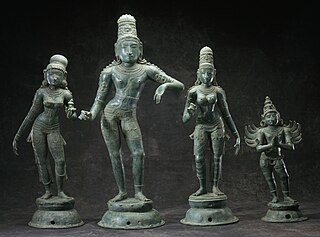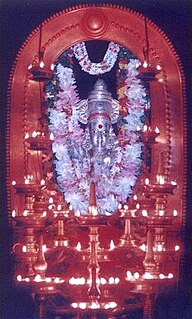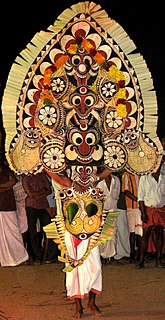South Indian culture refers to the culture of the South Indian states of Andhra Pradesh, Karnataka, Kerala, Tamil Nadu, and Telangana. South Indian culture though with its visible differences forms an important part of the Indian culture. The South Indian Culture is essentially the celebration of the eternal universe through the celebration of the beauty of the body and motherhood. It is exemplified through its dance, clothing, and sculptures.
Ottan Thullal is a dance and poetic performance form of Kerala, India. It was introduced in the 18th century by Kunchan Nambiar, one of the Prachina Kavithrayam. It is accompanied by a mridangam or an idakka.

Velakali is a traditional martial dance of Kerala that is performed by the Nair community during temple festivals. Brightly dressed dancers wielding swords and shields depict a fight sequence between the Pandavas and Kauravas during the course of the dance.

Hanuman Jayanti is a Hindu religious festival that celebrates the birth of Lord Sri Hanuman, who is immensely venerated throughout India and Nepal. This festival is celebrated on different days in different parts of India. In most states of India, the festival is observed either in Chaitra or in Vaishakha, while in a few states like Kerala and Tamil Nadu, it is celebrated in Dhanu.

Oppana is a popular form of social entertainment among the Mappila community of Kerala, South India, prevalent throughout Kerala, especially in Malappuram. The Malayalam word 'Oppana Pattu' is the derivation of the Tamil word 'Oppanai Pattu'. In Tamil, 'Oppanai' means make up. Oppana was originated on the occasion of make of Muslim brides. Oppana is extinct in Tamil Nadu. But in Kerala, this art form has been revived with much popularity on the performing stages of the Youth Festivals of the student community.

Satyabhama is the second most important wife of the God Krishna- the avatar of the god Vishnu. The third wife of Krishna after Rukmini and Jambavanti, Satyabhama is believed to be an avatar of Bhumī Devī, the Goddess of Earth. She aided Krishna in defeating the demon Narakasura.

Dr. Padma Subrahmanyam, is an Indian classical Bharata Natyam dancer. She is also a research scholar, choreographer, music composer, musician, teacher, Indologist and author. She is famous in India as well as abroad; several films and documentaries have been made in her honor by countries such as Japan, Australia and Russia. She is well known as the developer and founder of the dance form Bharata Nrithyam. She is a devotee of the Paramacharya of Kanchi.

Mudiyett or Mudiyettu is a traditional ritual theatre and folk dance drama from Kerala that enacts the mythological tale of a battle between the goddess Kali and the demon Darika. The ritual is a part of the bhagavathi or bhadrakali cult. The dance is performed in bhadrakali temples, the temples of the Mother Goddess, between February and May after the harvesting season. In 2010 Mudiyettu was inscribed in the UNESCO’s Representative List of the Intangible Cultural Heritage of Humanity, becoming the second art form from Kerala after Koodiyattam.
Adhyathmaramayanam Kilippattu is the most popular Malayalam version of the Sanskrit epic Ramayana. Adhyathmaramayanam kilippattu is believed to have been written by Thunchaththu Ramanujan Ezhuthachan in the early 17th century, and is considered to be a classic of Malayalam literature. It is a retelling of the Sanskrit work Adhyatma Ramayana in kilippattu format.Ezhuthachan used the Grantha based Malayalam script to write his Ramayana, although Vatteluttu writing system was the traditional writing system of Kerala then.. Recitation of Adhyathmaramayanam Kilippattu is very important in Hindu families in Kerala. In Kerala, Malayalam month of Karkitaka is celebrated as the Ramayana recitation month. Ramayana is recited in the houses and temples. Karkidaka is known as the month of Ramayana

Fast Forward is a 1985 dance film directed by Sidney Poitier. In the film, a dance troupe from Ohio comes to New York to compete in a national talent competition. The 1987 Bollywood film Dance Dance and the 2003 Tamil film Boys were inspired by this film.

Manapullikavu is in the Palakkad district in the Kerala State of India. The village is most famous for the temple Manappullikavu Vela.

Kummattikali or Kummatti Kali is the famous colorful mask-dance of Kerala, prevalent in Thrissur District, Palakkad District and parts of South Malabar. During the festival of Onam, Kummattikali performers move from house to house collecting small gifts and entertaining people. Kummatti dances are rampant in the Thrissur district during Onam. Pristine or original form of Kummattikali can be seen in the Bhadrakali temple in Palakkad district.

Darika is a character in Mudiyettu, a ritualistic dance from the Bhagavathi or Bhadrakali cult, usually performed only in the Kali temples of Kerala. The story is also known as "Darika vadham", or "death of Darika".

Janardana Swami Temple is a 2000-year-old temple situated in the municipality of Varkala city in Trivandrum. It is also known as Varkala Temple. Janardana Swami is a form of Lord Vishnu. It is a very well known temple in Kerala about 10.9 km west of Kallambalam on NH 66 near sea, 25 km north of Thiruvananthapuram city, 8 km south of famous backwater destination Kappil and 2 km from Varkala Railway Station,14 km north west of Attingal municipality. It is situated near the Arabian sea shore.It is referred to as Dakshin Kashi. The temple is located close to the Varkala Beach, which is considered to have medicinal properties since the waters wash the nearby medicinal plants. It is also an important Ayurveda treatment center. The temple has an ancient bell removed from a shipwreck, donated by the captain of the Dutch vessel which sank near Varkala without causing any casualties.

In Hindu mythology, Tumburu, also known as Tumbaru (तुम्बरु) and Tumbara (तुम्बर) is the best among Gandharvas or celestial musician and is sometimes described as the best of singers. He is described to perform in the courts of gods Kubera and Indra as well as sing praises of god Vishnu. He leads the Gandharvas in their singing.

Padayani, also called Padeni, is a traditional folk dance and a ritual art from the central portion of the Indian state of Kerala. A ceremonial dance involving masks, it is an ancient ritual performed in Bhagavati temples. The dance is performed in honor of Bhadrakaali. Meaning, a 'row of warriors', Padayani is an art form that blends music, dance, theatre, satire, facial masks, and paintings. It is part of worship of Bhadrakali and is staged in temples dedicated to the goddess from mid-December to mid-May. Padayani is unique to central Travancore, comprising the Pathanamthitta district of Kerala. Padayani is regarded as a remnant of the Dravidian forms of worship that existed before the advent of Brahmanism.

The Vellayani Devi is a highly revered shrine in Kerala, India, dedicated to goddess Bhadrakali. The shrine is situated in Vellayani 1.5 km west of Vellayani junction, 12 km southeast of Thiruvananthapuram on the eastern bank of Vellayani Lake. The temple is under the management of Travancore Devaswom Board. The temple structure has a bronze roof with traditional art work and carries Dravidian architecture. The temple has eastern and northern towers called Gopurams with statues of different Gods sculptured in them. The Gopurams function as gateways through the walls that surround the temple complex.
Pathiyanadu Sree Bhadrakali Temple is one of Hindu goddess Bhadrakali temple in Kerala. The shrine is in Mullassery. It is 1.5 kilometres from Karakulam under Nedumangad Thaluk. It is 12.5 kilometres from Thiruvananthapuram. The temple is managed by Pathiyanadu Sree Bhadrakali Kshetram Trust.
Sreelakshmy Govardhanan, is a Kuchipudi artiste from India. She is the disciple of Guru Sri Pasumarthy Rattaiaha Sarma. She is widely known for her grace, exquisite footwork and abhinaya, which comes alive during her dance performances. She is trained under distinguished Gurus such as Guru Sri Pasumarthy Rattaiah Sarma, Srimati Vyjayanti Kashi and Srimati Manju Barggavee, in Kuchipudi. Sreelakshmy is one of the rare artists who have gone in search of the roots of Kuchipudi, and has been fortunate to learn it from the most authentic artist belonging to the Kuchipudi yakshagana, Sri Pasumarthy Rattaiha Sarma. Being an artist from Kerala and travelling to Kuchipudi village to learn the classical art form of Andhra and to master it takes a lot of hard work, dedication and perseverance. The art form to her is like second skin. Sreelakshmy Govardhanan is widely acclaimed for her ability to bring alive the charm and beauty of Kuchipudi. She has been described as “a dancer who has harnessed the power of Abhinaya”. Sreelakshmy has been the recipient of many coveted titles and honours such as ‘Kalashree’ from Kerala Sangeetha Nataka Akademi- state award, Binfeild Endowment from Narada Gana Sabha Chennai, Bharatham Yuva Kalakar, Kala Ratna, Singar Mani, Natya Ratna, Nalanada Nrutya Nipuna to name a few. Sreelakshmy is an empanelled artiste in ‘established’ category of Indian Council for Cultural Relations and a graded artiste of Doordarshan. Other than performing at various prestigious Indian dance festivals, she has performed on various international platforms in Netherlands, Australia, Italy, France, Germany, Switzerland, United Kingdom, United States, Colombia, Jordan and Gulf countries that has earned her rave reviews. She performed in the presence of the Prime Minister of India, as the lead of the Kuchipudi team at the ‘Make In India’ program at Hannoer Messe, 2015 in Germany. She was also invited to choreograph a confluence of Indian dance for the inaugural event of ‘Marhaba NaMo in Dubai’ where Prime Minister of India visited United Arab Emirates after 34 years. She also has conceived and curated many dance related workshops and events and was the coordinator of ‘Rasavikalpam’ an annual dance workshop and National dance festival organized by Kerala Sangeetha Nataka Akademi for three consecutive years. Sreelakshmy is the founder and Director of Avantika Space for Dance, a platform dedicated to learning, performance and research. She has choreographed dance moves for the Malayalam feature film Kanyaka Talkies and Priyamanasam. Sreelakshmy is a trained professional Psychologist utilises her proficiency in dance and psychological counselling to bring a difference in her Art and also for young minds in need.

Poothamkali is folk art form in state of Kerala, India. This art form uses various types of decorations in the costume. It is usually performs in the Bhagavathy temples of Malappuram district. It is based on the myth of durga and her combat with Darika asura.


















